Dr. Seuss First Edition Identification
The conventional wisdom among booksellers is first edition Dr. Seuss books cannot be identified without the dust jacket. This used to be true. With the recent discovery of some salient information, today, most of the large format Dr. Seuss books can be identified as first printings without the dust jacket.
There are a couple of cases where the first printing book is indistinguishable from the book used in the 2nd and 3rd printing. In these cases, the book remained unchanged but the dust jacket was changed. Even so, these books still have collectibility (desirability) and value.
To help clarify, from the ABAA’s glossary:
Edition & Printing:
Edition includes the copies of a book or other printed material which originate from the same plates or setting of type. If 500 copies of a book are printed on Oct. 5 and 300 copies are printed from the same substantially unchanged plates on Dec. 10, all 800 copies are part of the same edition.
Printing: the copies of a book or other printed material which originate from the same press run or from the same plates or setting of type at one time.
In the example given for "Edition" above, the 500 copies would be the first printing and the 300 copies comprise the second printing.
First Edition:
All of the copies printed from the first setting of type; can include multiple printings if all are from the same setting of type. When book collectors use the term first edition, they are usually referring to the first printing and if there are different states or issues, the earliest of those.
In all of the Dr. Seuss books presented, the first edition book can be identified without the dust jackets. In nearly all cases, the book is also the first edition/first printing. In a couple of cases, the book is the first edition/’first or early’ printing.
We describe ‘Availability’ for each of the books. Most of the first edition books are difficult to find in the market. ‘Very difficult’ means one or no copies are usually available from the internet bookselling sites (ABE, Alibris, or Bookfinder). ‘Extremely difficult’ means a copy is not usually on the market, however might surface once or twice per year.
[Note: Where applicable, below, the book’s title links to the identification points for the first edition book with dust jacket.]
It’s difficult to price first edition books without dust jackets. A first edition Mulberry Street with dust jacket might sell for $8000 in Very Good condition. The first edition book might sell in the $300-$600 range, so about 1/20th the value of the first edition book with dust jacket.
The Cat In The Hat first edition book with dust jacket would have a market value of $4000 or so in Very Good condition. The first edition book might sell for $50 or so, since it is not too difficult to find.
Since the Dr. Seuss first edition books with dust jacket are too expensive for many children’s book collectors, they might consider the first edition book without dust jacket as an alternative.
And To Think That I Saw It On Mulberry Street 1937
 Title page with ‘1937,’ Vanguard Press, and copyright page with no additional printings listed. Marco’s shorts are white on the front cover; on later printings Marco had blue shorts.
Title page with ‘1937,’ Vanguard Press, and copyright page with no additional printings listed. Marco’s shorts are white on the front cover; on later printings Marco had blue shorts.
Availability: ‘White pants’ books are extremely difficult to find.
The 500 Hats Of Bartholomew Cubbins 1938
The front endpapers progress from large hats to small hats; the rear endpapers progress from small hats to large hats. On later printings the progression was reversed.
Availability: ‘Large-to-small hat’ books are extremely difficult to find.
The King’s Stilts 1939
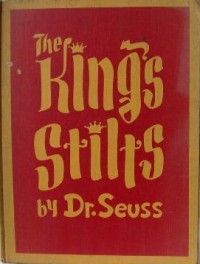 Front cover with the yellow text ‘The King’s Stilts by Dr. Seuss’ on a red background covering nearly the entire area. On later printings, the title was reduced in size, with red text on a yellow cloth background.
Front cover with the yellow text ‘The King’s Stilts by Dr. Seuss’ on a red background covering nearly the entire area. On later printings, the title was reduced in size, with red text on a yellow cloth background.
Availability: ‘Large logo’ books are very difficult to find.
Horton Hatches The Egg 1940
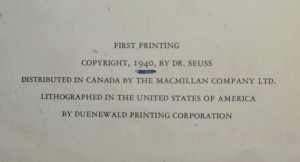
S
tates ‘First Printing’ on the copyright page.
Availability: ‘First Printing’ books are extremely difficult to find.
McElligot’s Pool 1947
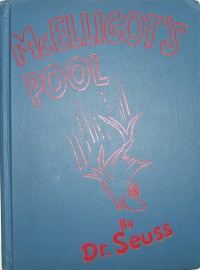 Front cover has fish with mouth open.
Front cover has fish with mouth open.
Availability: ‘Open mouth’ books are very difficult to find.
Thidwick: The Big-Hearted Moose 1948
 The first edition boards are red. The book with red boards was used with the first printing dust jacket (with ‘starburst’) and the second printing dust jacket (sans ‘starburst’, ‘200/200’ on front flap).
The first edition boards are red. The book with red boards was used with the first printing dust jacket (with ‘starburst’) and the second printing dust jacket (sans ‘starburst’, ‘200/200’ on front flap).
Availability: Red boards books are difficult to find.
Bartholomew And The Oobleck 1949
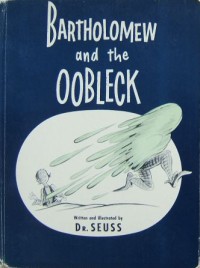 The first printing book has blue boards. Later printings were changed to red boards.
The first printing book has blue boards. Later printings were changed to red boards.
Availability: Blue boards books are difficult to find.
If I Ran The Zoo 1950
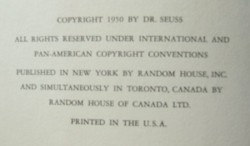 Copyright page with seven lines only, omitting the line “BASED ON MATERIAL WHICH ORIGINALLY APPEARED IN REDBOOK MAGAZINE.” Later printings have eight lines, including the Redbook line.
Copyright page with seven lines only, omitting the line “BASED ON MATERIAL WHICH ORIGINALLY APPEARED IN REDBOOK MAGAZINE.” Later printings have eight lines, including the Redbook line.
Availability: ‘No Redbook’ boards books are extremely difficult to find.
Horton Hears A Who 1954
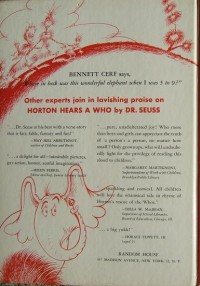 Horton has full ear on back cover and the list of other Seuss titles on the recto of the back free endpaper. Second printings also have Horton with full ear on back cover and Seuss title list on the copyright page.
Horton has full ear on back cover and the list of other Seuss titles on the recto of the back free endpaper. Second printings also have Horton with full ear on back cover and Seuss title list on the copyright page.
Availability: ‘Full ear/Rear titles page’ boards books are extremely difficult to find.
Availability: ‘Full ear/Copyright titles page’ books are very difficult to find.
If I Ran The Circus 1956
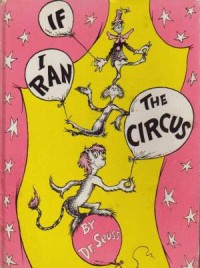 The first printing book has pink boards. Later printings were changed to red & yellow boards.
The first printing book has pink boards. Later printings were changed to red & yellow boards.
Availability: ‘Pink boards’ books are not so difficult to find.
The Cat In The Hat 1957
Matte boards with single binding signature. Later printings have glossy boards with three binding signatures.
The ‘matte cover with single signature’ book can be found with the 2nd printing dust jacket (no price on flap) and 3rd printing dust jackets (‘195/195’ on front flap).
Availability: ‘Single signature’ books a
re difficult to find.
How The Grinch Stole Christmas 1957
 Back cover with full page advertisement for The Cat In The Hat offered for sale for $2.00.
Back cover with full page advertisement for The Cat In The Hat offered for sale for $2.00.
This book was used on 2nd printing dust jackets (295/295 front flap) and 3rd printing dust jackets (295/295 and 16 titles listed).
Availability: ‘Back Ad $2.00’ books are not so difficult to find.
Cat In The Hat Comes Back 1958
 Copyright page states ‘First Printing.” Also, the snowball to the left of the Cat’s tail is only on the first edition book.
Copyright page states ‘First Printing.” Also, the snowball to the left of the Cat’s tail is only on the first edition book.
Availability: ‘First Printing’ books are not so difficult to find.
Happy Birthday To You 1959
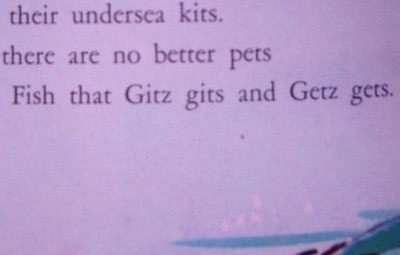 The first printing book has a printing error on page 34 (page beginning with “Today is your birthday”), with six white spots that do not appear in later printings.
The first printing book has a printing error on page 34 (page beginning with “Today is your birthday”), with six white spots that do not appear in later printings.
Availability: ‘White spots’ books are not so difficult to find.
It is a complicated subject, the idea of first edition being ‘first edition/first printing.’
As an example, the "conventional wisdom" first edition The Cat In The Hat, with the ‘200/200’ on the front flap, is considered the first printing, while the ‘200/200’ was in actuality used in numerous printings.
"Huh?", you ask. Let me explain.
The Cat In The Hat was first published in March of 1957. The sales far exceeded initial expectations. The ‘200/200’ dust jacket was used on the book into early 1958, and perhaps mid-1958.
The first instance I can find of the book’s price reduction to ‘195/195’ is in the October, 1958 edition of The Horn Book Magazine (pg. 325), where Random House advertises the first six Beginner Books for $1.95.
It is illogical to believe the initial printing of The Cat In The Hat for the March, 1957 publication was sufficient to supply books for all of the sales through January or March of 1958. And especially in light of sales being higher then initially expected.
Therefore the logical conclusion is there were multiple printings of the ‘200/200’ Cat In The Hat through the course of 1957.
The book collecting community currently cannot distinguish the first ‘200/200’ printing from each of the other ‘200/200’ printings, yet we still consider all as ‘first edition/first printing’.
The first edition ‘200/200’ Cat In The Hat routinely sells for $3000 in today’s market.